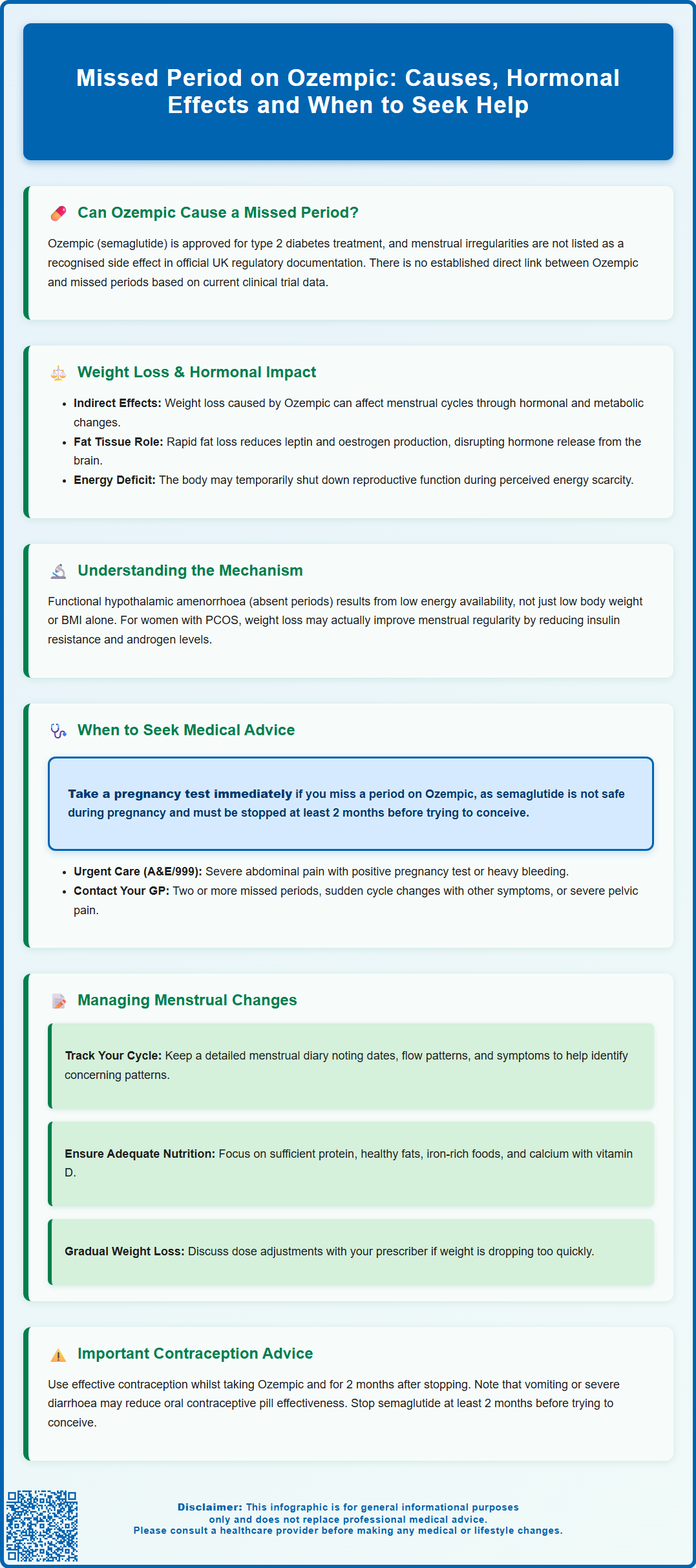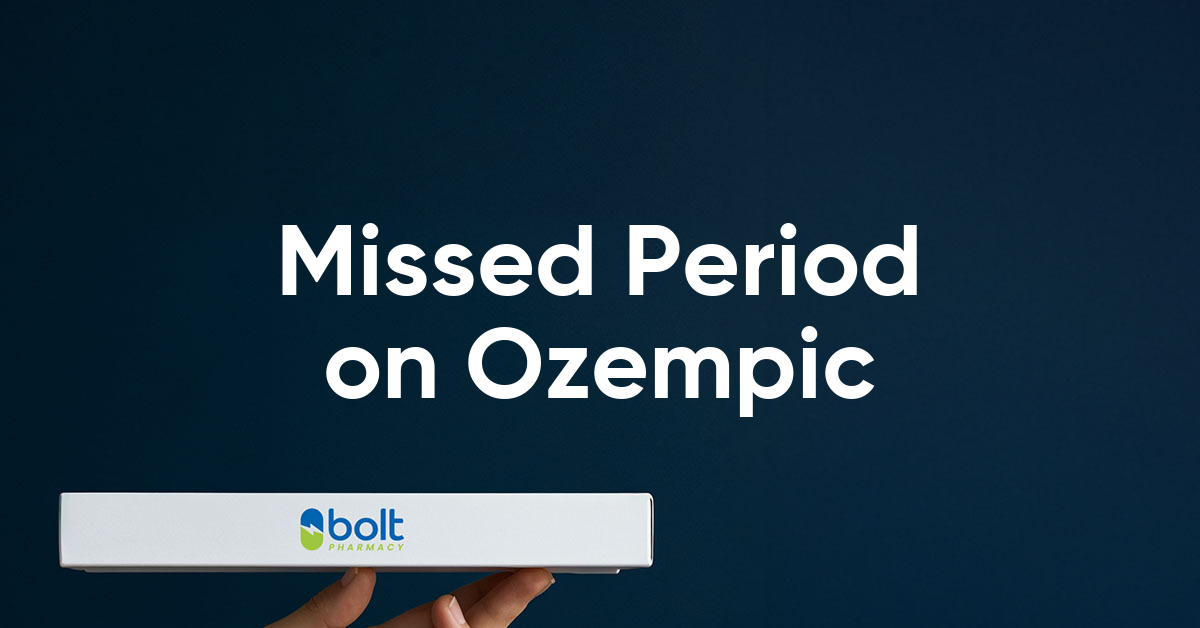Ozempic (semaglutide) is a GLP-1 receptor agonist licensed in the UK for type 2 diabetes mellitus. Whilst menstrual irregularities are not listed as recognised adverse reactions in the MHRA-approved Summary of Product Characteristics, some women report changes to their menstrual cycle during treatment. There is no established direct link between Ozempic and missed periods based on current clinical trial data. However, the weight loss commonly associated with semaglutide therapy can indirectly influence menstrual function through hormonal and metabolic pathways. Understanding these mechanisms helps distinguish between direct pharmacological effects and secondary changes related to body composition and metabolic status.
Summary: Ozempic does not directly cause missed periods, but the weight loss it produces can indirectly disrupt menstrual cycles through hormonal and metabolic changes affecting the hypothalamic-pituitary-ovarian axis.
- Semaglutide is a GLP-1 receptor agonist licensed in the UK for type 2 diabetes mellitus, not directly linked to menstrual irregularities in clinical trials.
- Rapid or significant weight loss can suppress reproductive function by reducing leptin and oestrogen levels, disrupting gonadotrophin-releasing hormone secretion.
- Women who miss periods on Ozempic should first rule out pregnancy and discontinue semaglutide at least 2 months before planned conception.
- Seek medical advice if you experience two or more consecutive missed periods, severe pelvic pain, abnormal bleeding, or signs of pregnancy.
- NICE guidance recommends comprehensive assessment for amenorrhoea including pregnancy test, thyroid function, prolactin, FSH, LH, and pelvic ultrasound if indicated.
- Gradual weight loss, adequate nutrition, stress management, and menstrual diary monitoring can help manage cycle changes during semaglutide treatment.
Table of Contents
Can Ozempic Cause a Missed Period?
Ozempic (semaglutide) is a glucagon-like peptide-1 (GLP-1) receptor agonist licensed in the UK for the treatment of type 2 diabetes mellitus. Menstrual irregularities are not listed as a recognised adverse reaction in the Summary of Product Characteristics (SmPC) approved by the Medicines and Healthcare products Regulatory Agency (MHRA), though some women have reported changes to their menstrual cycle while taking this medication.
There is no established link between Ozempic and missed periods based on current clinical trial data. However, the weight loss that commonly accompanies semaglutide therapy can indirectly influence menstrual function through hormonal and metabolic pathways. It is important to distinguish between a direct pharmacological effect of the drug itself and secondary effects related to changes in body composition and metabolic status.
Semaglutide works by mimicking the action of GLP-1, a naturally occurring incretin hormone that enhances insulin secretion, suppresses glucagon release, and slows gastric emptying. These mechanisms lead to improved glycaemic control and reduced appetite, which may result in weight reduction. The hormonal shifts associated with weight loss—rather than the medication directly—are more likely to account for menstrual disturbances in women taking Ozempic.
It's worth noting that Ozempic is licensed for type 2 diabetes, while Wegovy (also semaglutide, but at higher doses) is the UK-licensed product specifically for weight management.
If you experience a missed period while taking Ozempic, it is essential to consider other potential causes, including pregnancy, stress, underlying gynaecological conditions, or changes in body weight. A thorough clinical assessment is necessary to determine the underlying cause and ensure appropriate management.
Weight Loss, Hormones and Menstrual Changes
Rapid or significant weight loss can have profound effects on the hypothalamic-pituitary-ovarian (HPO) axis, the hormonal system that regulates the menstrual cycle. When body weight decreases substantially—particularly if it occurs quickly—the body may interpret this as a state of energy deficit, triggering adaptive responses that can suppress reproductive function.
Adipose (fat) tissue is not merely a storage depot; it is an active endocrine organ that produces hormones, including oestrogen and leptin. Leptin, in particular, plays a crucial role in signalling energy availability to the brain. When fat stores diminish rapidly, leptin levels fall, which can disrupt the pulsatile release of gonadotrophin-releasing hormone (GnRH) from the hypothalamus. This disruption may lead to reduced secretion of luteinising hormone (LH) and follicle-stimulating hormone (FSH) from the pituitary gland, ultimately resulting in anovulation (absence of ovulation) and menstrual irregularities, including missed periods.
This condition, known as functional hypothalamic amenorrhoea, is primarily related to low energy availability rather than simply low body weight or BMI alone.
In women with polycystic ovary syndrome (PCOS), weight loss can paradoxically improve menstrual regularity by reducing insulin resistance and androgen levels. However, in others—especially those who lose weight very rapidly—menstrual cycles may become irregular or cease altogether.
Key hormonal changes associated with weight loss include:
-
Decreased leptin signalling to the hypothalamus
-
Reduced oestrogen production from adipose tissue
-
Alterations in insulin sensitivity and androgen levels
These metabolic and hormonal adaptations are the body's way of conserving energy during perceived scarcity, but they can temporarily disrupt normal reproductive function. Understanding this mechanism helps contextualise why menstrual changes may occur during significant weight loss, whether achieved through medication, diet, or lifestyle modification.

When to Seek Medical Advice About Missed Periods
Whilst occasional menstrual irregularities can be benign, certain circumstances warrant prompt medical evaluation. If you miss a period while taking Ozempic, the first step is to rule out pregnancy. Semaglutide is not recommended during pregnancy, and should be discontinued if pregnancy occurs or is planned. Women planning pregnancy should stop semaglutide at least 2 months before conception due to the long half-life of the drug.
You should contact your GP or healthcare provider if you experience any of the following:
-
Two or more consecutive missed periods without an obvious explanation
-
Sudden cessation of previously regular cycles, particularly if accompanied by other symptoms
-
Severe pelvic pain, abnormal vaginal bleeding, or discharge (seek same-day assessment via NHS 111, urgent GP appointment, or Early Pregnancy Unit if pregnancy is possible)
-
Signs of pregnancy such as nausea, breast tenderness, or fatigue
-
Symptoms suggesting hormonal imbalance, including excessive hair growth, acne, or significant mood changes
-
Unintentional weight loss exceeding clinical targets or signs of malnutrition
If you have severe abdominal pain with a positive pregnancy test or heavy bleeding, seek urgent medical care through A&E or call 999.
According to NICE guidance, women with amenorrhoea (absence of menstruation for three months or more in those with previously regular cycles, or six months in those with irregular cycles) should undergo a comprehensive assessment. This typically includes a detailed medical history, physical examination, and relevant investigations such as:
-
Serum pregnancy test (beta-hCG)
-
Thyroid function tests (TSH, free T4)
-
Prolactin levels
-
Follicle-stimulating hormone (FSH) and luteinising hormone (LH) (note: FSH is not routinely recommended to diagnose perimenopause in women aged 45 or over)
-
Oestradiol levels
-
Androgen profile if PCOS is suspected
-
Pelvic ultrasound if structural causes are suspected
If you think you might be pregnant, stop taking Ozempic immediately and contact your prescriber. For women of childbearing potential, effective contraception is recommended during treatment with semaglutide and for at least 2 months after discontinuation. While injectable semaglutide does not reduce oral contraceptive efficacy, vomiting or severe diarrhoea may affect absorption of oral contraceptive pills.
Managing Menstrual Changes While Taking Ozempic
If you experience menstrual irregularities while taking Ozempic, several strategies can help manage these changes whilst maintaining the therapeutic benefits of the medication. Open communication with your healthcare team is essential to ensure a holistic approach to your treatment.
Monitoring and documentation can provide valuable insights. Keep a menstrual diary noting the dates of your periods, flow characteristics, and any associated symptoms. This information helps your GP or specialist identify patterns and determine whether intervention is needed. Similarly, tracking your weight loss trajectory can reveal whether changes are occurring too rapidly.
Nutritional adequacy is paramount during weight loss. Ensure you are consuming sufficient calories and nutrients to support overall health, including reproductive function. A registered dietitian can help develop a balanced eating plan that supports your diabetes management goals whilst providing adequate energy and micronutrients. Particular attention should be paid to:
-
Adequate protein intake to preserve lean muscle mass
-
Sufficient healthy fats, which are essential for hormone production
-
Iron-rich foods to prevent anaemia, especially if periods become heavier
-
Calcium and vitamin D for bone health
Gradual, sustainable weight loss is generally preferable to rapid reduction. If you are losing weight very quickly on Ozempic, discuss with your prescriber whether dose adjustment might be appropriate. Any changes to your medication should be prescriber-led to ensure your diabetes control is maintained.
For women with PCOS or other underlying hormonal conditions, continued monitoring and possible adjustment of concurrent treatments (such as metformin or hormonal contraceptives) may be necessary. Your GP may refer you to an endocrinologist or gynaecologist for specialist input if menstrual disturbances persist or are accompanied by other concerning features.
Stress management and adequate sleep also support hormonal balance. Chronic stress can disrupt the hormonal axis that regulates menstruation. Incorporating stress-reduction techniques such as mindfulness, regular physical activity, and good sleep hygiene may help stabilise menstrual function.
If you are planning pregnancy, remember to stop semaglutide at least 2 months before conception and discuss alternative diabetes management strategies with your healthcare team.
Temporary menstrual changes during significant weight loss may resolve once weight stabilises and the body adapts to its new metabolic state. However, seek medical review if irregularities persist.
If you suspect Ozempic may be causing side effects, you can report these through the MHRA Yellow Card Scheme (yellowcard.mhra.gov.uk).
Frequently Asked Questions
Does Ozempic directly cause missed periods?
No, Ozempic (semaglutide) does not directly cause missed periods according to current clinical trial data and the MHRA-approved product information. However, the weight loss associated with semaglutide can indirectly affect menstrual cycles through hormonal changes in the hypothalamic-pituitary-ovarian axis.
When should I see a doctor about a missed period whilst taking Ozempic?
Contact your GP if you miss two or more consecutive periods, experience sudden cessation of regular cycles, have severe pelvic pain or abnormal bleeding, or suspect pregnancy. If you are pregnant, stop Ozempic immediately and contact your prescriber, as semaglutide is not recommended during pregnancy.
How does weight loss from Ozempic affect hormones and periods?
Rapid weight loss reduces leptin and oestrogen production from adipose tissue, which can disrupt the hypothalamic-pituitary-ovarian axis. This may lead to reduced secretion of luteinising hormone and follicle-stimulating hormone, potentially causing anovulation and menstrual irregularities including missed periods.
The health-related content published on this site is based on credible scientific sources and is periodically reviewed to ensure accuracy and relevance. Although we aim to reflect the most current medical knowledge, the material is meant for general education and awareness only.
The information on this site is not a substitute for professional medical advice. For any health concerns, please speak with a qualified medical professional. By using this information, you acknowledge responsibility for any decisions made and understand we are not liable for any consequences that may result.
Heading 1
Heading 2
Heading 3
Heading 4
Heading 5
Heading 6
Lorem ipsum dolor sit amet, consectetur adipiscing elit, sed do eiusmod tempor incididunt ut labore et dolore magna aliqua. Ut enim ad minim veniam, quis nostrud exercitation ullamco laboris nisi ut aliquip ex ea commodo consequat. Duis aute irure dolor in reprehenderit in voluptate velit esse cillum dolore eu fugiat nulla pariatur.
Block quote
Ordered list
- Item 1
- Item 2
- Item 3
Unordered list
- Item A
- Item B
- Item C
Bold text
Emphasis
Superscript
Subscript












